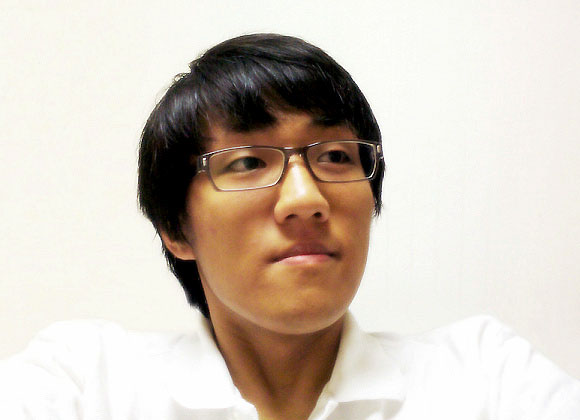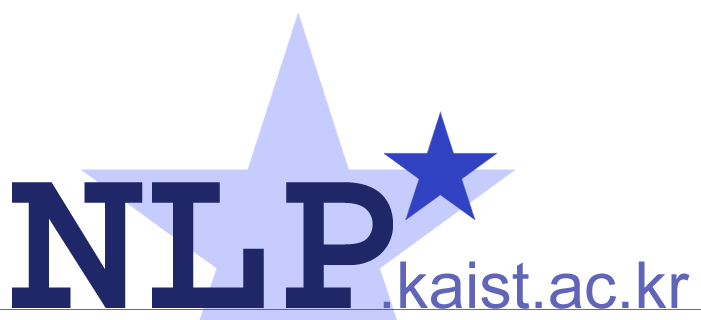 |
Jin-Woo Chung, Ph.D. (м†ХмІДмЪ∞)Postdoctoral researcher
Natural Language Processing and Computational Linguistics Laboratory School of Computing Korea Advanced Institute of Science and Technology
|
Note: Jin-Woo Chung moved to Samsung Advanced Institute of Technology (мВЉмД±м†ДмЮР мҐЕнХ©кЄ∞мИ†мЫР) on May 2019. This page may no longer be updated.
Research Interests
- Natural language processing and computational linguistics
- Inferring implicit relations between entities from news and scientific articles
- Analyzing spatiotemporal aspects of events in narrative text
- Text mining for scientific knowledge discovery
- Text augmentation for people with reading difficulties
Publications
- Jin-Woo Chung, Wonsuk Yang, and Jong C. Park, вАЬUnsupervised inference of implicit biomedical events using context triggersвАЭ, BMC Bioinformatics 21, 29, 2020. (SCI IF=2.511)
- Wonsuk Yang, Jin-Woo Chung, and Jong C. Park, вАЬAssessing the multi-level knowledge prominence perceived by the authors as revealed on their writingsвАЭ, Language and Information, Vol. 23, No. 2, 2019.
- Wonsuk Yang, Jung-Ho Kim, Jin-Woo Chung, and Jong C. Park, вАЬA Corpus of Sentential Annotations on News Editorials with Multi-dimensional Credibility MetricsвАЭ, HCI Korea (HCIK) 2019, Jeju, Korea, February 13-16, 2019.
- Huije Lee, Jin-Woo Chung, and Jong C. Park, вАЬMitigating Stereotypes in Word Embedding through Sentiment ModulationвАЭ, Korea Software Congress (KSC) 2018, Pyeongchang, Korea, December 19-21, 2018.
- Fitsum Gaim, Jin-Woo Chung, and Jong C. Park, вАЬNeural Grammatical Error Correction by Simulating the Human Learner and the Human ProofreaderвАЭ, Korea Software Congress (KSC) 2018, Pyeongchang, Korea, December 19-21, 2018.
- Hoyun Song, Jinseon You, Jin-Woo Chung, and Jong C. Park,¬†¬†вАЬFeature Attention Network: Interpretable Depression Detection from Social MediaвАЭ,¬†32nd Pacific Asia Conference on Language, Information and Computation (PACLIC-32), Hong Kong Polytechnic University, Hong Kong,¬†December 1-3, 2018. (accepted)¬†(acceptance rate: 32%)
- Jinseon You, Jin-Woo Chung, Wonsuk Yang, and Jong C. Park, вАЬExtraction of Gene-Environment Interaction from the Biomedical LiteratureвАЭ, In Proceedings of the 8th International Joint Conference on Natural Language Processing (IJCNLP 2017), pages 865вАУ874, Taipei, Taiwan, November 27вАУDecember 1, 2017. (acceptance rate: 31%)
- Jin-Woo Chung, Wonsuk Yang, Jinseon You, and Jong C. Park, вАЬInferring Implicit Event Locations from Context with Distributional SimilaritiesвАЭ, In Proceedings of the 26th International Joint Conference on Artificial Intelligence (IJCAI-17), pages 979-985, Melbourne, Australia, August 19-25, 2017. (acceptance rate: 26%)
- Jimin Park,¬†Jin-Woo Chung, and Jong C. Park, вАЬClassification of relations between biological entities using word vectorsвАЭ, Korea Computer Congress (KCC), Jeju, Korea, June 29-July 1, 2016.
- Jin-Woo Chung, Jinseon You, and Jong C. Park, вАЬCorpus annotation with a linguistic analysis of the associations between event mentions and spatial expressionsвАЭ, In Proceedings of the 29th Pacific Asia Conference on Language, Information, and Computation (PACLIC 29), pages 539-547, Shanghai, China, October 30-November 1, 2015. (acceptance rate: 28.5%)
- Rize Jin, Jinseon You, Jin-Woo Chung, Hee-Jin Lee, and Jong C. Park, вАЬCoMAGD: Annotation of gene-depression relationsвАЭ, In Proceedings of the 2015 ACL Workshop on Biomedical Natural Language Processing (BIONLP 2015), pages 104вАУ113, Beijing, China, July 30, 2015.
- Jin-Woo Chung, Hee-Jin Lee, and Jong C. Park, вАЬCorpus annotation for the linguistic analysis of reference relations between event and spatial expressions in textвАЭ, Language and Information, Vol. 18, No. 2. pages 141-168, 2014.
- Hye-Jin Min, Sang-Chae Kim, Joon-Yeob Kim, Jin-Woo Chung, and Jong C. Park, вАЬSpeaker-TTS voice mapping towards natural and characteristic robot storytellingвАЭ, In Proceedings of the 22nd IEEE International Symposium on Robot and Human Interactive Communication (IEEE RO-MAN 2013), pages 793-800, Gyeongju, Korea, August 26-29, 2013.
- Jin-Woo Chung, Hye-Jin Min, JoonYeob Kim, and Jong C. Park, вАЬEnhancing readability of web documents by text augmentation for Deaf peopleвАЭ, International Conference on Web Intelligence, Semantics, and Mining (WIMS’13), Madrid, Spain, June 12-14, 2013. (acceptance rate: 39%)
- Hye-Jin Min, Jin-Woo Chung, and Jong C. Park, вАЬIdentification of speakers in fairytales with linguistic cluesвАЭ, Language and Information, Vol. 17, No. 2. pages 1-30, 2013.
- JoonYeob Kim,¬†Jin-Woo Chung, and Jong C. Park, вАЬAnalyzing and mapping expressions of tense for Korean-Korean sign language translationвАЭ, In Proceedings of the Korean Institute of Information Scientists and Engineers (KIISE) Fall Conference, Vol. 39 No. 2-B, pages 121-123, 2012.¬†
- Jin-Woo Chung and Jong C. Park, вАЬText parsing for sign language generation with Combinatory Categorial GrammarвАЭ, 2nd International Workshop on Sign Language Translation and Avatar Technology (SLTAT 2011), 13th International ACM SIGACCESS Conference on Computers and Accessibility (ASSETS 2011), Dundee, UK, October 23, 2011.
- Jin-Woo Chung, Ho-Joon Lee, and Jong C. Park, вАЬImproving accessibility to web documents for the aurally challenged with sign language animationвАЭ, International Conference on Web Intelligence, Mining and Semantics (WIMS’11), Sogndal, Norway, May 25-27, 2011. (acceptance rate: 35%)
- Jin-Woo Chung¬†and Jong C. Park, вАЬDetecting and resolving syntactic ambiguity for automatic Korean-Korean sign language translationвАЭ, In Proceedings of the 22nd Annual Conference on Human and Cognitive Language Technology (HCLT), pages 55-62, 2010.
- Jin-Woo Chung, Ho-Joon Lee, and Jong C. Park, вАЬSentence type identification in Korean: applications to Korean-sign language translation and Korean speech synthesisвАЭ, Journal of the HCI Society of Korea, Vol. 5, No. 1, pages 25-35, 2010.
- Jin-Woo Chung, Ho-Joon Lee, and Jong C. Park, вАЬIntonation generation for Korean speech synthesis with automated sentence type classificationвАЭ,¬†HCI Korea (HCIK), Pheonix Park, January 27-29, 2010.¬†
- Jin-Woo Chung and Jong C. Park, вАЬAutomated classification of sentential types in Korean with morphological analysisвАЭ, Language and Information, Vol. 13, No. 2, pages 59-97, 2009.
Academic Activities
Academic Membership
- Professional Member, Association for Computing Machinery (ACM) (2017-Present)
Program Committee Member
- 31st Pacific Asia Conference on Language, Information, and Computation (PACLIC 2017)
- 30th Pacific Asia Conference on Language, Information, and Computation (PACLIC 2016)
Scientific Committee Member
- 32nd Pacific Asia Conference on Language, Information, and Computation (PACLIC 2018)
Reviewer
- 58th annual meeting of the Association for Computational Linguistics (ACL 2020)
- ACM Transactions on Asian and Low-Resource Language Information Processing (TALLIP) (2016-Present)
- Journal of Computing Science and Engineering (JCSE) (2016-Present)
- 2016 IEEE/RSJ International Conference on Intelligent Robots and Systems (IROS 2016)
- 24th Annual International Conference on Intelligent Systems for Molecular Biology (ISMB 2016)
(area: Databases, Ontologies & Text Mining) - 29th Pacific Asia Conference on Language, Information, and Computation (PACLIC 2015)
Secondary Reviewer
- ACL 2018 Best Paper Selection Committee
- 7th International Workshop on Health Text Mining and Information Analysis (LOUHI 2016)
- 6th International Conference on Web Intelligence, Mining and Semantics (WIMSвАЩ16)
- ACL-IJCNLP 2015 System Demonstration
- 28th Pacific Asia Conference on Language, Information, and Computation (PACLIC 2014)
- 27th Pacific Asia Conference on Language, Information, and Computation (PACLIC 2013)
Program Committee Coordinator
- 31th Pacific Asia Conference on Language, Information, and Computation (PACLIC 2017)
- 6th International Joint Conference on Natural Language Processing (IJCNLP 2013)
Research Project Experience (at KAIST)
- вАЬPrediction and augmentation of the credibility distribution via linguistic analysis and automated evidence document collectionвАЭ (мЦЄмЦінХЩм†Б лґДмДЭ л∞П м¶Эк±∞лђЄмДЬ мЮРлПЩ мИШмІСмЭД нЖµнХЬ мЛ†лҐ∞лПД лґДнПђ мЮРлПЩ мШИмЄ° л∞П мЮРлПЩ м¶Эк∞Х), funded by Institute for Information & Communications Technology Promotion (IITP), Korea (4/2018 – present)
- вАЬAn automatic feedback system for the prevention and early treatment of depressive symptoms through language use analysisвАЭ (нШДлМАмЭЄмЭШ мЪ∞мЪЄ л∞П лґИмХИ м¶ЭмГБмЧР лМАнХЬ мШИл∞© л∞П м°∞кЄ∞ мєШл£Мл•Љ мЬДнХЬ к∞ЬмЭЄмЭШ мЦЄмЦі мВђмЪ© лґДмДЭ кЄ∞л∞Ш мЮРлПЩ нФЉлУЬл∞± мЛЬмК§нЕЬ), funded by National Research Foundation (NRF), Korea (3/2017 – present)
- вАЬEmotional Intelligence Technology to Infer Human Emotion and Carry on Dialogue AccordinglyвАЭ (мГБлМАл∞©мЭШ к∞РмД±мЭД мґФл°† нМРлЛ®нХШмЧђ кЈЄмЧР лІЮмґФмЦі лМАнЩФнХШк≥† лМАмЭСнХ† мИШ мЮИлКФ к∞РмД± мІАлК• мЧ∞кµђк∞Ьл∞Ь), funded by Institute for Information & Communications Technology Promotion (IITP), Korea (12/2016 – present)
- вАЬAn automatic gene network inference system based on large-scale text mining for complex diseasesвАЭ (л≥µмЮ° мІИнЩШмЭД мЬДнХЬ лМАмЪ©лЯЙ нЕНмК§нКЄ лІИмЭілЛЭ кЄ∞л∞Ш мЬ†м†ДмЮР лД§нКЄмЫМнБђ мЮРлПЩ мґФл°† мЛЬмК§нЕЬ), funded by National Research Foundation (NRF), Korea (11/2014 – 10/2016)
- вАЬEvent extraction and discourse-level background scene selection for story-to-scene generationвАЭ (мЭімХЉкЄ∞ нЕНмК§нКЄмЧРмДЬмЭШ м£ЉмЪФ мВђк±і мЛЭл≥Д л∞П лђЄмЮ•/лЛ®лЭљ лЛ®мЬДмЭШ мЮ•л©і л∞∞к≤љ мД†нГЭ мХМк≥†л¶ђм¶Ш к∞Ьл∞Ь), funded by Electronics and Telecommunications Research Institute (ETRI), Korea (5/2014 – 2/2015)
- вАЬObject selection with limited resources and coreference resolution for story-to-scene generationвАЭ (нХЬм†ХлРЬ мЮРмЫРмЭД кЄ∞л∞ШмЬЉл°Ь нХЬ мµЬм†БмЭШ к∞Эм≤і мД†нГЭ кЄ∞мИ† л∞П к∞Эм≤і к∞Д м∞Єм°∞ нШДмГБ нХімЖМ мХМк≥†л¶ђм¶Ш к∞Ьл∞Ь), funded by Electronics and Telecommunications Research Institute (ETRI), Korea (5/2013 – 2/2014)
- вАЬAn automatic conversion from the text in Korean into animations in Korean sign language in a web environmentвАЭ (мЫє нЩШк≤љмЭШ нЕНмК§нКЄмЧР лМАнХЬ нХЬкµ≠мЦі-мИШнЩФ мЮРлПЩ л≤ИмЧ≠ кЄ∞мИ† мЧ∞кµђ), funded by National Research Foundation (NRF), Korea (5/2010 – 4/2013)
- вАЬDeveloping the multimodal emotion expression DB and automatic behavior generation mechanismвАЭ (л©АнЛ∞л™®лЛђ к∞Рм†Х/мГБнЩ©/мЭШлПД нСЬнШД DB л∞П нСЬнШД мЮРлПЩмГЭмД±), funded by the 21st Century Frontier R&D Programs, Ministry of Knowledge Economy, Korea (4/2009 – 3/2013)
Teaching
Teaching assistants
- CS790 Technical Writing for Computer Science, Head TA (Fall 2014)
- CS372 Natural Language Processing with Python, Head TA (Spring 2014)
- CS372 Natural Language Processing with Python (Spring 2013)
- CS372 Natural Language Processing with Python, Head TA (Spring 2012)
- CS579 Computational Linguistics, Head TA (Fall 2011)
- CS560 Database System (Spring 2011)
- CS520 Programming Language (Fall 2009)
Awards
- NAVER PhD Fellowship, Nov. 2017, NAVER Corp.
- Best Teaching Assistant Award, Sept. 2014, School of Computing, KAIST
- Course: Natural Language Processing with Python (CS372)
- Best Paper Award, Jan. 2011, HCI Society of Korea
- Paper: Jin-Woo Chung, Ho-Joon Lee, and Jong C. Park, вАЬSentence type identification in Korean: applications to Korean-sign language translation and Korean speech synthesisвАЭ, Journal of the HCI Society of Korea, Vol. 5, No. 1, pages 25-35, 2010.
- KAIST Student Fellowship, 2009-2017, Korean Government
Education
- PhD (2018): School of Computing, KAIST
- Thesis: Extracting spatial information about events from text
- Advisor: Prof. Jong C. Park
- MS (2011): School of Computing, KAIST
- Thesis: Identifying sentence types in Korean with morpho-syntactic analysis
- Advisor: Prof. Jong C. Park
- BS (2009): Department of Computer Science, Sogang University
